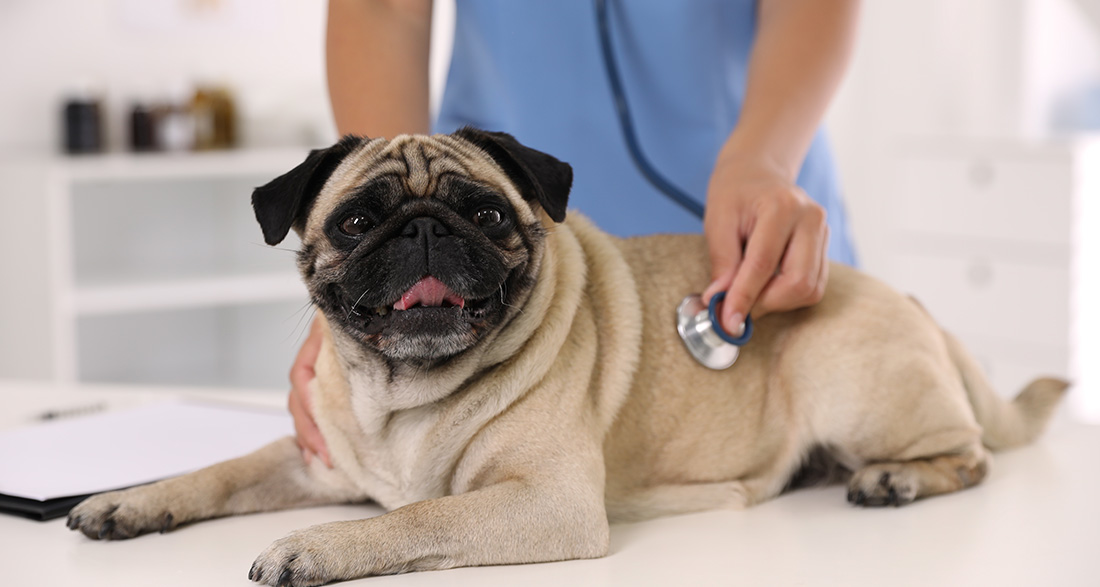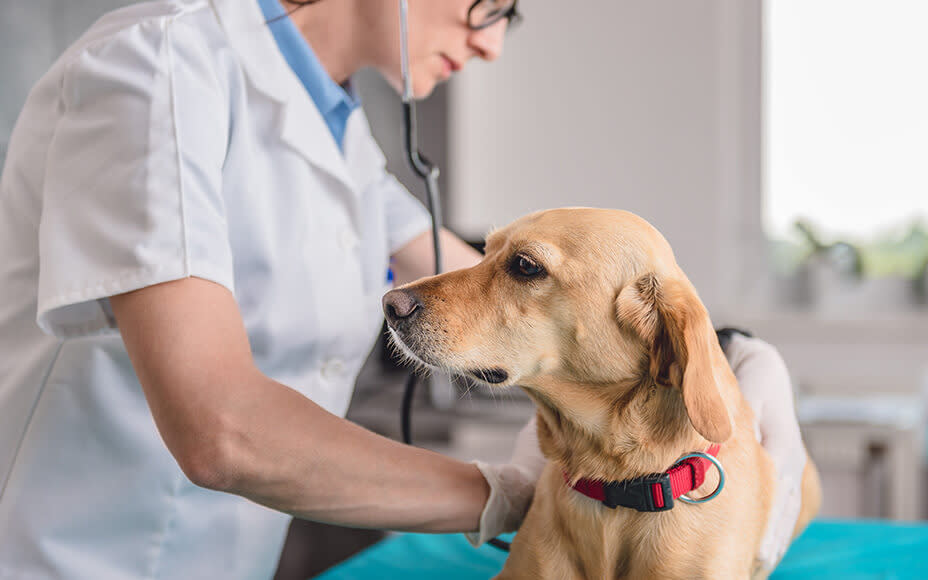How to recognize stomach aches in dogs, the diagnostic process, and the underlying causes – learn everything about treating stomach aches in dogs.
Stomach Aches in Dogs: Identifying the Causes
Unlike us bipeds, your dog can’t communicate if it has stomach aches. Therefore, you can only recognize them through certain symptoms ranging from loss of appetite and lethargy to vomiting. The causes are diverse, and diagnosis is not always straightforward. Learn how to identify if your dog has stomach aches, how they are diagnosed, and the treatment process at the veterinarian.
Possible Causes
Food and Food Allergies:
In many cases, stomach aches in dogs can be traced back to food. With food allergies, besides severe itching, there can be stomach aches and vomiting. Allergies usually occur to the protein source in the food, such as beef or chicken. Allergies to carbohydrate sources like potatoes and rice are also possible.
Is your furry friend allergic to one or more ingredients? Our iHugDogs Sensitive food is tailored to the needs of allergic companions, ensuring carefree enjoyment from the bowl!
Poisoning:
The situation becomes serious if your furry friend has eaten something toxic to dogs or even a poison bait. Quick action is crucial, and attentiveness is key. Especially food-loving breeds like Labradors or Beagles rarely say no to snacks lying around and may even see the fruit bowl with grapes as their personal bowl. Our four-legged friends are unaware that such snacks can be toxic and life-threatening. Poisoning leads to trembling, vomiting, dizziness, and severe stomach aches within a short time. Usually, your dog lies on the floor, lacking the strength to stand up. Immediate visits to the veterinarian are essential.
Did you know that you can reduce the risk of poisoning through suitable poison bait training? By teaching your dog not to eat anything from the ground and only to eat on your command, it is less likely to pick up everything it finds on the roadside. Instead of unsuitable foods, opt for training with species-appropriate and healthy snacks. Sugar, grains, or artificial flavors? You won’t find them in our products! Just a click, and the training can begin.
Gastrointestinal Infections:
Stomach aches are usually due to gastrointestinal tract infections. Similar to humans, our furry friends occasionally catch something that upsets their stomachs. Infections typically last only a few days, and once your dog’s immune system has recovered, the stomach rumbling also disappears.
Diseases:
Unfortunately, diseases like cancer with tumors also affect our dogs. In rare cases, severe diseases might be the cause of your dog’s stomach aches, diagnosed through comprehensive testing. Apart from tumors, gastritis, where your dog’s stomach lining is inflamed, causing severe stomach aches, could also be the culprit. Recovery takes some time, and with stomach diseases, the pain usually persists for several days to weeks until the treatment takes effect.

Pancreatitis:
Pancreatitis in dogs is a serious condition that often requires hospitalization. In pancreatitis, the exocrine part of the pancreas, responsible for producing digestive enzymes, is inflamed. There are acute and chronic forms of pancreatitis. Unlike the acute one, chronic inflammation develops gradually. Overweight, infections, and poisoning are possible causes of pancreatitis, leading to stomach aches in your dog.
Healthy special food for a sensitive and compromised digestive tract? Our Wet Food VET Stomach & Intestine Fit is ideal for your furry friend if its stomach is grumbling loudly, plagued by digestive problems, or suffering from diseases like pancreatitis.
Flatulence:
If gases accumulate excessively in the digestive tract, they cause flatulence and sometimes stomach aches. This is usually not dangerous but very uncomfortable for your dog. In short, your furry friend will fart more frequently than usual. If this doesn’t subside after a few days and fever is present, it could be a sign of intestinal inflammation, requiring a prompt visit to the veterinarian.
Gastric Torsion:
Especially in large dogs, it is often advised to keep calm and wait until the meal is digested after eating. Not without reason, because gastric torsion leads to the pinching of nerves and vessels, causing severe pain. Dogs then suffer from intense pain and often attempt to vomit. Every minute counts here, and timely surgery is necessary.

Foreign Bodies:
Just as it can happen with vacuum cleaners on four paws around leftover food, it can sometimes occur with toys or other objects. If your dog is playful or known for chewing on everything, it may lead to the ingestion of objects. Unlike food, these objects maintain their shape in the stomach and can cause severe stomach aches. Especially sharp objects can not only cause pain but also result in serious internal injuries or intestinal blockage, making an emergency visit to the veterinarian necessary.

Constipation or Intestinal Blockage
In case of constipation, your furry friend cannot empty itself. Food with insufficient fiber or inadequate fluid intake makes the stool not slippery enough, causing it to move slowly or not at all in the intestines. When everything comes to a standstill, it is referred to as an intestinal blockage. Intestinal blockage represents the complete obstruction of the intestines, causing severe pain. Cramp-like stomach aches may indicate an intestinal blockage, where, in addition to dietary constipation, a swallowed object can also be the cause.
Symptoms and Diagnosis
Stomach aches in dogs manifest through the following symptoms:
- Whining and whimpering
- Restlessness
- Withdrawal
- Discomfort
- Lethargy
- Apathy
- Licking of lips
- Diarrhea
- Vomiting
- Body postures like “downward dog”
To determine the type of stomach aches your dog is experiencing and the exact cause, veterinarians can conduct various tests. Sometimes, palpation is sufficient, while in other cases, diagnoses can be made through blood tests, X-rays, or allergy tests. For a food allergy, the diagnosis ranges from a blood test to an exclusion diet to identify the cause. Specialized conditions may require more intensive examinations.
Treatment and Therapy
Depending on the severity of stomach aches and their causes, veterinarians initiate necessary measures. While therapy for food allergies involves an exclusion diet and subsequent dietary changes, acute emergencies like pancreatitis, intestinal blockage, and gastric torsion require immediate surgery.

Swallowing foreign bodies and intestinal blockage also necessitate prompt action. Infections or mild inflammations are treated with appropriate medications and generally improve quickly. If your dog has been poisoned, the severity depends on the ingested amount. Half a grape may cause stomach aches, but it is not as life-threatening as consuming poison bait or a whole avocado pit.
It is crucial to have accurate information about poisonings or object ingestion to expedite the work at the veterinarian’s office. Under no circumstances should you induce vomiting in your dog or attempt to help with medications from your home pharmacy. Most human remedies are not suitable for dogs, and attempting to help your dog can do more harm than good. Although certain healing herbs may provide relief, they should never be fed without consulting veterinarians. Persistent stomach aches should always be handled by professionals.
To prevent stomach aches, you can support your dog’s healthy nutrition and ideally ensure it never has access to toxic foods. Diseases can only be influenced to a limited extent, so it’s worth creating as healthy living conditions as possible through diet, ample exercise, and a stress-free environment.


